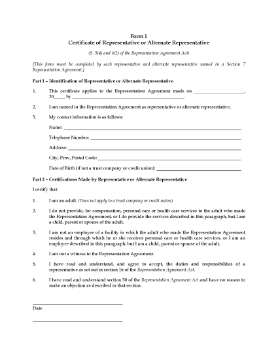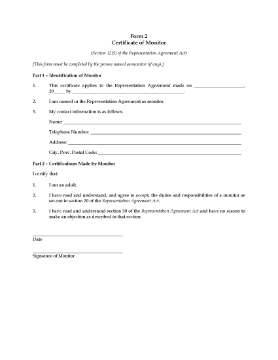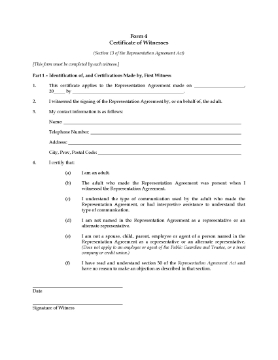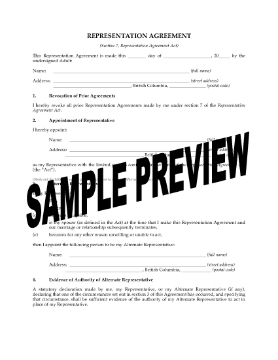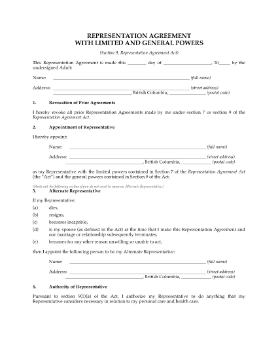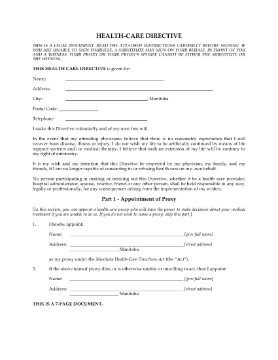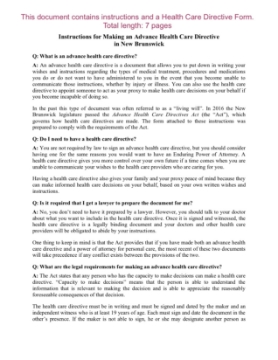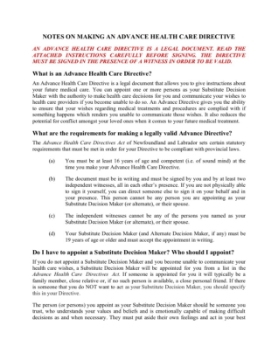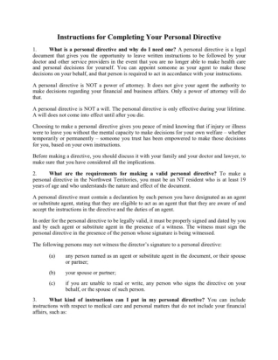Canada Advance Health Care Directive Forms
Make sure your doctor and your family know your wishes for medical treatment with these Advance Directive Forms for Canadian residents.
What is the purpose of an advance directive?
An Advance Directive is a legal document that allows a person to make their medical treatment wishes known in advance. It is meant to give guidance to healthcare providers and family members if you become unable to communicate your wishes due to illness or injury.
What is included in an advance directive?
Commonly, an advance health care directive will include:
Living Will: A document that specifies what types of medical treatments you want or do not want to receive to prolong your life (e.g., ventilator, feeding tubes) if you are terminally ill or permanently unconscious. A living will is only effective during your lifetime and should not be confused with your last will and testament.
Durable Power of Attorney for Health Care (or Health Care Proxy): A document that appoints someone you trust as your agent or proxy to make health care decisions on your behalf if you become incapable of making those decisions.
How does Canadian law affect patients' rights to refuse treatment?
In general, patients in Canada retain the right to refuse consent for any medical procedure for any reason. Health care providers are legally obligated to respect the wishes expressed in your advance directive. However, they are not required to carry out any instructions that are against the law.
Canadian courts have confirmed that advance directives must be respected by health care professionals. If you are uncertain whether your end-of-life instructions are legally binding, you should consult a lawyer in your area for guidance.
Which form should I use?
Each province and territory of Canada has its own requirements and laws governing advance directives. Choose the form for your province / territory to ensure that it is right for you.
Alberta Personal Directive Form
What would happen if you suddenly became unable to look after yourself? Make your wishes known ahead of time with this Personal Directive form for Alberta residents.
- In a Personal Directive (sometimes called an advance health care directive or a living will), you appoint someone you trust as your agent to make personal care decisions on your behalf if you have been determined to lack capacity to make those decisions for yourself.
- Using this form you can give your agent detailed instructions and set out your wishes regarding:
- health care,
- accommodation,
- persons you can live and associate with,
- participation in social activities,
- educational activities,
- employment activities,
- legal matters, and
- other non-financial personal matters.
- This Personal Directive is a free fillable PDF form from the Government of Alberta, Form OPG5521 rev. 2020-05.
British Columbia Form 1 Certificate of Representative
Download this Certificate of Representative or Alternate Representative if you have made a Section 7 Representation Agreement under the B.C. Representation Agreement Act.
- The Act requires that each representative and alternate representative you named in your Representation Agreement must complete this form before they can act on your behalf.
- This is a prescribed form under B.C. laws.
- Available in MS Word format.
- Intended to be used only in the Province of British Columbia, Canada.
British Columbia Form 2 Certificate of Monitor
Download this Certificate of Monitor if you have named a monitor in a Section 9 Representation Agreement under the B.C. Representation Agreement Act.
- The Act requires that any person you named as a monitor in your Representation Agreement must complete this form before they can act on your behalf.
- This is a prescribed form under B.C. laws.
- Available in MS Word format.
- Intended to be used only in the Province of British Columbia, Canada.
British Columbia Form 4 Certificate of Witnesses
Download this Certificate of Witnesses if you have made a Representation Agreement under the B.C. Representation Agreement Act.
- Section 13 of the Act requires every person who witnesses your signature of the Representation Agreement to complete this form.
- This is a prescribed form under B.C. laws.
- Available in MS Word format.
- Intended to be used only in the Province of British Columbia, Canada.
British Columbia Representation Agreement Package (Section 7)
Make sure that your wishes are followed in the event that you become physically or mentally incapacitated, with this Representation Agreement Package (Section 7) for the Province of British Columbia.
- A Representation Agreement allows you to appoint someone you trust as your representative to make decisions for you in the event you become unable to do so. These decisions include medical care, living conditions, personal, financial and legal matters.
- This form is referred to as a Section 7 Agreement, which means that you grant your representative only the limited powers set out under Section 7 of the Representation Agreement Act.
- The package contains:
- Representation Agreement,
- Form 1, Certificate of Representative and Alternate Representative,
- Form 2, Certificate of Monitor,
- Form 4, Certificate of Witnesses,
- Statutory Declaration for Evidence of Authority of Alternate Representative,
- Instructions to help you complete the Section 7 Representation Agreement.
- Available in MS Word format.
- Intended to be used only in the Province of British Columbia, Canada.
British Columbia Representation Agreement Package (Section 9)
BC residents, make sure that your wishes are followed in the event that you become incapacitated, with this Representation Agreement Package (Section 9).
- A Representation Agreement allows you to appoint someone as your representative to make decisions for you if you are not able to do so. These decisions include medical care, living conditions, personal, financial and legal matters.
- This legal form is referred to as a Section 9 Agreement, which means that you grant your representative the broad and general powers set out under Section 9 of the British Columbia Representation Agreement Act.
- The package contains:
- Representation Agreement,
- Statutory Declaration for Evidence of Authority of Alternate Representative,
- Notes on Completing a Representation Agreement.
- Download the British Columbia Representative Agreement Package (Section 9) and appoint your representative today.
- Available in MS Word format.
Manitoba Health Care Directive
Make your Health Care Directive with this downloadable easy-to-use form for Manitoba residents.
Why do I need a Health Care Directive?
A Health Care Directive (also called a living will or advance directive) ensures that your wishes for medical treatment are followed in the event that you become unable to communicate those wishes due to illness or injury.
How does a Health Care Directive work?
In this document, you can appoint someone you trust to act on your behalf as your proxy and give that person detailed instructions as to what types of medical treatment you want or don't want.
What is included in the form?
The Health Care Directive form includes:
- information and instructions to help you complete the form,
- a Declaration of Incapacity form to be signed by two medical doctors.
Format and Governing Law
This is a downloadable MS Word file, which is easy to fill in and print. There is no need to buy multiple copies for your household. This form can be used by anyone in the family who wants to make a Health Care Directive.
This Manitoba Health Care Directive form was prepared in accordance with the Health Care Directives Act and should only be used by individuals who reside in the Province of Manitoba, Canada.
New Brunswick Advance Health Care Directive
Make sure that your family and your doctor know your wishes for medical treatment in case you become unable to make health care decisions, with this New Brunswick Advance Health Care Directive form.
- An advance health care directive lets you give instructions regarding what types of medical treatment you want or don't want in case you are determined to be incapable of making health care decisions.
- Having a health care directive is crucial if you become unable to communicate your wishes.
- The form also includes information and instructions to help you complete the document.
- No need to buy separate copies for each family member. You can use this form over again as often as you like.
- The form is downloadable and easy to fill in and print. To get yours, just add it to your cart and check out.
- This Advance Health Care Directive form is compliant with the Enduring Powers of Attorney Act (New Brunswick) and is current to January 2021.
Newfoundland Advance Health Care Directive
Make an Advance Health Care Directive with this easy form for Newfoundland and Labrador.
- You can appoint one or more persons to act as your substitute decision maker, to make health care decisions for you if you are unable to do so due to illness or injury.
- You can use this form to give your decision maker detailed instructions and set out your wishes regarding what types of medical treatment you want or don't want.
- You can also give end-of-life instructions on which treatments should be administered to you if you have a terminal illness or are in a permanent coma.
- This form was prepared in accordance with the Advance Health-Care Directives Act of Newfoundland and Labrador and it contains instructions to help you complete each section.
Northwest Territories Personal Directive Form
Make your wishes for end-of-life treatment known by putting them in writing in this Personal Directive form for Northwest Territories.
- A Personal Directive allows you the opportunity to set out your wishes regarding what types of medical treatment you want or don't want, in the event that you are diagnosed with a terminal condition or are in a coma with no real chance of recovery.
- You can name someone you trust to act as your agent to give consent and make medical and personal care decisions on your behalf if you are unable to, due to incapacity or medical condition.
- The form also includes information and instructions to help you complete your Personal Directive.
- Updated 2019 to ensure compliance with the Personal Directives Act.
- This legal document should only be used in the Northwest Territories, Canada.
- 1
- 2


